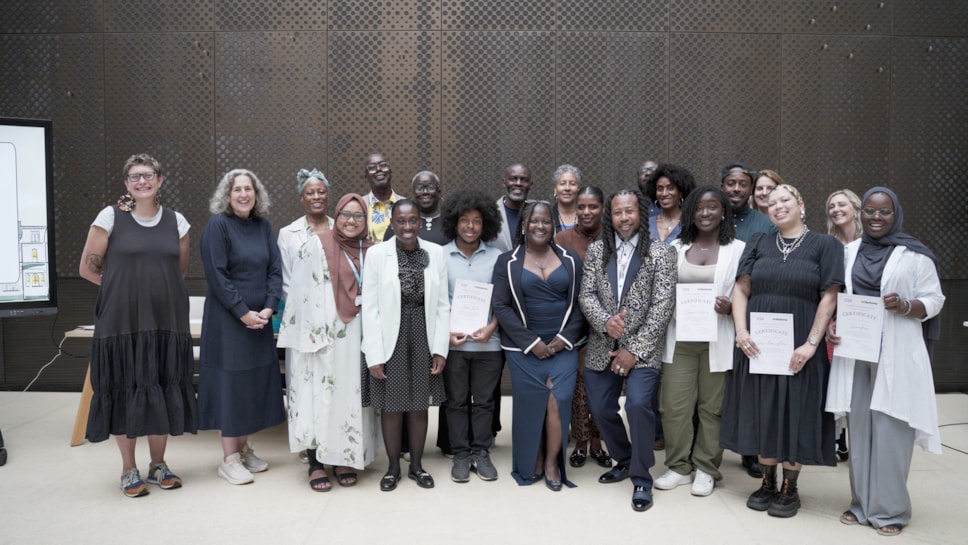
Hackney Thinking Spaces phase one finale showcases achievements and lays recommendations for future change
Hackney Council hosted a celebration to mark the end of the Hackney Thinking Spaces project - a bold community-led initiative tackling the deep and ongoing impact of systemic and structural racism on Black and Global Majority residents in Hackney.
The event, which was held on Thursday 24 July brought together local residents, community leaders, and partners to reflect on the achievements of the programme, share stories of personal and collective change, and look ahead to next steps.
Attendees took part in group activities and viewed powerful visual storytelling from the project, with keynote speeches from Dr Sandra Husbands, Director of Public Health for City and Hackney, and Patrick Vernon OBE, social commentator and campaigner on race, health, and inequality.
Dr Sandra Husbands said: “Hackney Thinking Spaces has shown the power of what happens when we listen deeply, make space for healing, and give communities the tools and trust to shape the systems that affect their lives. This is public health at its most human – grounded in truth, led by lived experience, and focused on justice.”
Hackney Thinking Spaces was commissioned in March 2024 in response to long standing inequalities and recent safeguarding reviews highlighting how systemic racism continues to harm children, young people, and families from Caribbean and African backgrounds.
Delivered in partnership by IFoundMe and the Hackney Thinking Spaces Community Advisory Board (CAB), the project created therapeutic spaces where people could come together to explore and heal from the effects of racial trauma, while also building community-led solutions for change.
Emily Lewis, Managing Director of I Found Me Therapeutic Counselling CIC, said: "Hackney Thinking Spaces is very close to my heart - it's a reflection of hope, healing, and community. For me, it's a reminder that when we create brave spaces for people to be heard, seen, and valued, transformation becomes possible. Every story shared is a seed planted, and together, we’re growing something powerful and beautiful."
The programme has had a tangible impact. From April 2024 to March 2025, 20 sets of community-based therapeutic groups were held across the borough, attended by hundreds of residents. Participants overwhelmingly described the sessions as safe, empowering and transformative. Many reported feeling more hopeful, more connected to others, and better equipped to advocate for themselves and their communities. A number of participants have since trained as peer mentors or taken up opportunities to influence local decision-making.
The Community Advisory Board, made up of 18 BAME residents alongside system leaders from Hackney Council, the NHS and the voluntary sector, has worked over the last year to co-produce a set of recommendations for system change to address systemic and structural racism locally. This process has involved CAB members engaging with participants of the Hackney Thinking Spaces groups and key stakeholders from the NHS, CAMHS, Hackney Council and the Voluntary and Community Sector.
These recommendations are grounded in lived experience and highlight the need for long-term, structural shifts across areas including emotional health and wellbeing, specifically focusing on promoting preventative approaches and considering partnerships for a model relevant to Hackney’s diverse communities; reviewing commissioning processes in order to increase access to funding and commissioning; increasing access to community spaces in Hackney; and reviewing the existing Black History 365 as a platform to increase awareness of Black/African history, underpinned by shared understanding of Black History (led by experts): Education, Empowerment, Fulfilment, Purpose.
Professor Patrick Vernon OBE added: “This is not just a project - it’s a movement for dignity, for equity, and for community-led change. Hackney Thinking Spaces has created a model that others can learn from. It’s about putting people before process, and values before systems. The next step is to keep this momentum going and make these recommendations a lived reality.”
As this phase of the project draws to a close, the Council and partners remain committed to sustaining and building on its legacy. The co-produced recommendations will continue to be shared with and developed alongside statutory bodies, voluntary organisations, and local communities. Further work is already underway to secure further funding, embed the Thinking Spaces model in long-term planning, and ensure that community voices remain central in shaping services.
Notes to editors
More information about Hackney Thinking Spaces can be found here.
